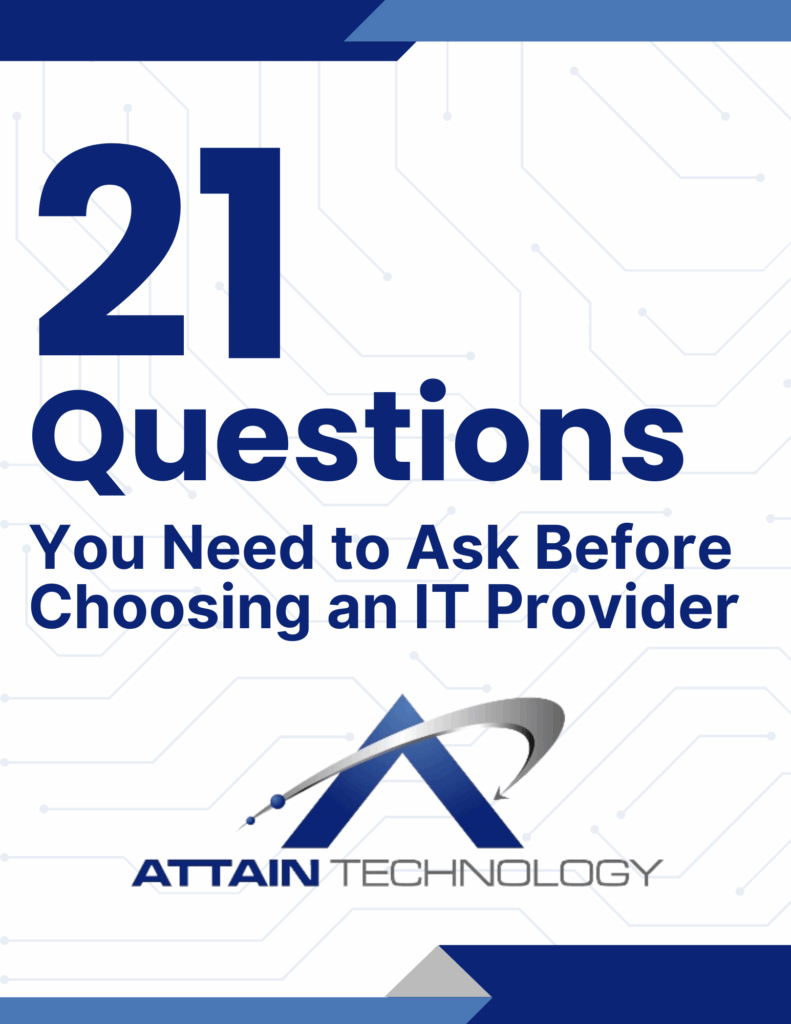
Not Asking These IT Questions Could Leave You at Risk
Fill Out The Form Or Call at 508-459-8845
Is your IT provider doing what they
say they are doing?
Here are 21 questions you need to be asking when evaluating an IT provider.


Fill Out The Form Or Call at 508-459-8845
Is your IT provider doing what they
say they are doing?
Here are 21 questions you need to be asking when evaluating an IT provider.

Avoid common IT pitfalls like surprise fees, poor response times, and hidden gaps in service.

Use the side-by-side comparisons to see which IT provider truly aligns with your business needs.

Find out who offers personalized services built for your New England business and who is offering generic, automated support.

Make sure your IT provider has the expertise to keep your systems running with proactive solutions that keep your team on schedule.
Choosing an IT provider is a big decision, which is why we aim to make it as stress-free as possible. We want to make sure you are choosing an IT provider that truly supports your New England business with transparent, comprehensive, and reliable solutions that fuel your growth.

As you delve deeper into selecting an IT provider, remember to evaluate their disaster recovery plans. An effective disaster recovery strategy can save your business from catastrophic losses. Ask potential providers about their recovery time objectives (RTO) and recovery point objectives (RPO). These metrics will help you understand how quickly they can restore services and minimize data loss in case of a disaster.
Look for a provider that offers a comprehensive plan, including regular backups, data redundancy, and a clear communication strategy for keeping clients informed during and after an incident. Ensuring that your IT provider has a robust disaster recovery plan is not just about minimizing downtime; it’s also about maintaining your reputation and trust with clients.
Furthermore, ask about their incident response protocols. How do they handle breaches or outages? A reliable IT partner should have a clear, step-by-step process for identifying, containing, and remediating incidents, as well as informing affected parties.
It’s also wise to inquire about their approach to compliance with industry regulations. Depending on your business, you may have to adhere to specific legal standards, such as HIPAA for healthcare or PCI DSS for payment processing. A knowledgeable IT provider will not only understand these regulations but will also implement systems that keep your business compliant.
Finding an IT provider that can match your business’s needs and growth trajectory is crucial. Look for providers with case studies that showcase their experience in managing similar businesses. This can give you insight into their problem-solving capabilities and the level of service you can expect.
Finally, trust your instincts. If you feel a provider isn’t being entirely transparent or is rushing the process, it may be worth considering other options. Building a partnership with your IT provider is essential, and you want to work with someone who values your business as much as you do.
Consider the following questions when interviewing potential IT providers:
Additionally, you may want to assess their technology stack. What tools and software do they utilize, and how do these solutions compare to industry standards? This information can indicate the provider’s commitment to staying current with technology trends.
Moreover, inquire about their response times for support queries. A provider that guarantees quick turnaround times during emergencies can be invaluable to your operations.
Finally, consider their philosophy regarding training and support. A good IT provider will offer ongoing training to ensure your team is equipped to handle the systems in place. This investment in your staff can lead to a more efficient and empowered workforce.
When selecting an IT provider, it’s essential to understand the nuances of your options. A well-chosen IT partner can significantly impact your business efficiency and security. For instance, consider a scenario where a company faces frequent downtime due to inadequate IT support. By choosing the right provider, they can implement robust systems that minimize interruptions, thus saving time and resources.
Additionally, the importance of clear communication cannot be overstated. An IT provider that prioritizes communication ensures that businesses are always in the loop regarding system updates, potential threats, and maintenance schedules. This level of transparency fosters trust and allows for more informed decision-making on the part of the business.
Moreover, businesses should evaluate the scalability of the IT solutions offered. As companies grow, their IT needs will evolve. Therefore, a flexible IT provider can adapt to these changes, offering services that align with the business trajectory. For instance, during peak seasons, a company may require increased bandwidth or additional cybersecurity measures. A reliable IT partner will anticipate these needs and provide solutions ahead of time.
It’s also vital to consider the provider’s expertise in specific industries. Some IT companies specialize in sectors like healthcare, finance, or education, each having unique compliance and security requirements. Understanding these specializations can help businesses select a provider that not only meets their IT needs but also understands the specific challenges they face.
Furthermore, businesses should ask potential providers about their approach to cybersecurity. In an era where data breaches are increasingly common, a proactive stance on security can make a significant difference. Providers should be able to demonstrate their strategies for preventing cyberattacks, including regular security audits, employee training, and advanced threat detection systems.
Lastly, customer support is a critical factor to assess. Businesses should inquire about the support structure of the IT provider. Are they available 24/7? Do they offer multiple channels for support, such as phone, email, or live chat? Having access to immediate assistance can prevent minor issues from escalating into major setbacks.
In conclusion, selecting the right IT provider involves a comprehensive evaluation of their services, communication styles, and industry knowledge. By asking the right questions and thoroughly vetting potential partners, businesses can ensure they make a choice that supports their long-term goals and operational efficiency.